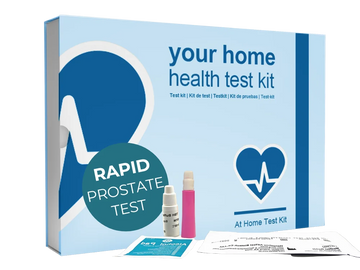Prostate Health Test

Prostate Health Test
Instant delivery
Money-back guarantee
Fast results
Secure process
SAVE with bundles
1,000,000+ customers
Understand your PSA levels quickly and privately, with results at home in just 10 minutes.
Our CE-marked at-home kit lets you take a simple finger-prick blood sample and gives you a clear indication of your Prostate Specific Antigen (PSA) level. PSA is a protein made by the prostate gland, and changes in PSA can happen for many reasons — from age-related changes and benign enlargement to infections or other conditions.
Having this information can be a useful starting point for a conversation with your GP about whether further checks are needed.
Order today and have your PSA results in minutes – quick, discreet, and ready to share with your GP.
Why check your PSA?
- PSA is a biomarker produced naturally by the prostate gland and measurable in blood.
- Levels can fluctuate due to non-cancerous factors such as age, exercise, or inflammation.
- A raised PSA does not mean cancer — but it may prompt further discussion with your GP.
- A normal PSA does not rule out issues — it’s simply one piece of useful information for you and your doctor.
What’s included
- CE-marked home test kit
- Step-by-step instructions for simple use
- Test cassette, lancet, and sample tools
- Results clearly displayed in about 10 minutes
How it works
- Order online – kit delivered discreetly.
- Collect a finger-prick blood sample using the lancet provided.
- Apply to the test cassette and allow it to run.
- Read your results in minutes – clear, simple, and ready to share with your GP.
Prostate Specific Antigen (PSA) is a protein produced by the prostate gland, which sits just below the bladder and plays a role in semen production.
Measuring PSA levels can provide useful information about the prostate. Levels can vary naturally and may be affected by factors such as age, prostate enlargement (benign hypertrophy), inflammation (prostatitis), recent activity, or other conditions.
This test provides an indication of whether your PSA level falls inside or outside the expected range. Results are shown as “Normal” or “Higher than expected”. If your result is higher than expected, it should be discussed with a GP, who may recommend further checks or a follow-up blood test.
Customer support
- 24/7 customer service for peace of mind
- UK-based team with nutritional training
- Rated Excellent on Trustpilot
Important information
This is not a diagnostic test. PSA levels can be influenced by many factors, and results should always be discussed with a qualified healthcare professional before making any health decisions.
Take charge of your health today – order your Prostate Health Test now and get quick, discreet results you can share with your GP
- Receive your test kit in the post.
- Clean your finger and use the finger prick lancet to release blood.
- Fill the capillary dropper with blood up to the black line.
- Squeeze two drops of the blood into the sample area marked S on the test cassette.
- Allow the blood to absorb and add one drop of single use buffer to the sample well.
- Wait 5 minutes for the results to appear.
NOTE: Do not interpret before 5 minutes or after 10 minutes as the results may be inaccurate.













